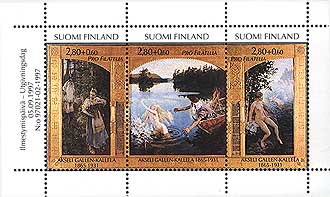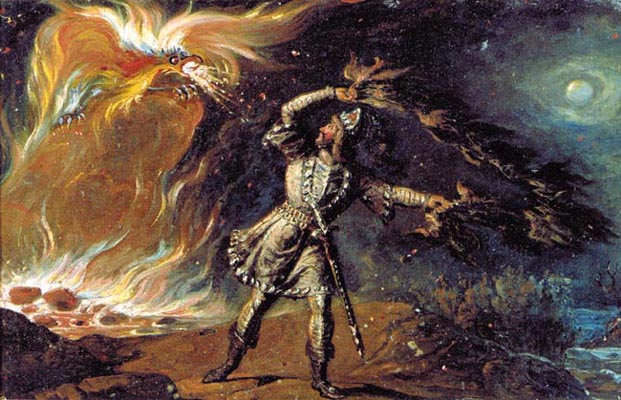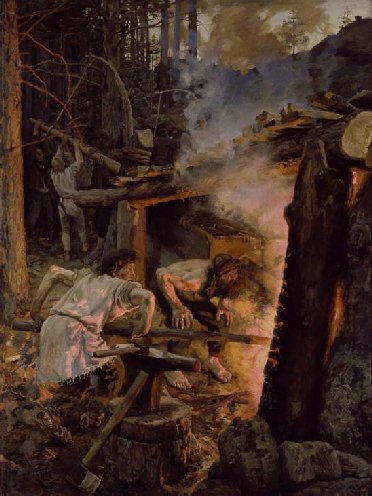The Myth, Magic, Love and War.
The Literature of the Finnish People

Aino and Väinämöinen

Lemminkäinen
|
Land of Heroes |

Aino and Väinämöinen

Lemminkäinen
No national epic lies so firmly in the heart of its people as the Kalevala. The Kalevala was compiled in the 1800s by Elias Lönnrot -- physician, literary scholar, linguist -- who was inspired to uncover a literary heritage of the Finnish people. His medical circuits and research trips took him to outlying villages in Karelia on both sides of Finland's border with Russia, where he recorded Finnish folk poems, called runos, performed by local singers.These poems, along with many collected by other researchers, were combined by Lönnrot into the most important book ever to appear in Finland. His epic generated a new pride in Finnish national identity, of the Finnish language, and an independence movement that eventually brought into being an independent Finland.
Today, every Finnish boy and girl knows stories from the Kalevala and studies the epic in school. Children, streets, towns, and businesses are named after Kalevala characters, and Finnish art, music, dance, and theater frequently draw on Kalevala themes. Internationally, the Kalevala is recognized as a masterpiece of world literature.
The descriptions of magic in the Kalevala have survived from an ancient time when shamanism was an important part of Finnish tribal life. A similar belief pattern has been found in existing tribal cultures around the world and is thought to have once been common throughout Europe as well.In the Kalevala, magic is made by chanting special runos. These runos often petitioned gods or spirits, or spoke of origins. According to the ancient beliefs, anyone could use the magic runos, but great magicians or spoke of origins. According to the ancient beliefs, anyone could use the magic runos, but great magicians like Väinämöinen knew more runos and more powerful ones than common people did. Another belief was that the spell created by a runo could be undone by singing the words in backward order.
As wild as the scene may be, it is far from barbaric. The craft of the shipwright, the blacksmith, and goldsmith, healer, or the brewer has plainly reached a high level; household management and the laws of hospitality are well understood; fine fabrics are woven, fine jewels esteemed; personal cleanliness and the rites of the sauna, are widely practised in every home; music is an important part of of life, even having special powers, and songs are often accompanied on the kantele, a stringed instrument still in use. There is constant and highly poetic praise of beauty, whether of bird, or tree or maiden. Imagination is perhaps an outstanding characteristic of the characters, who conspicuously prefer skill or guile or magic to the use of force.
Runo I After a preamble by the bard, he proceeds to relate the creation myth of how the Virgin of the Air descended into the sea, where she is fertilized by the winds and waves and becomes the Water-Mother. A teal builds a nest on her knee, and lays eggs. The eggs fall from the nest and break, but the fragments form the earth, sky, sun, moon and clouds. The Water-Mother creates bays, sea-shores, and the depths and shallows of the ocean. Väinämöinen is born from the Water-Mother, and is tossed about by the waves for a long time until he reaches the shore.
Runo II Väinämöinen clears and plants the country, and sows barley.
Runo III The Laplander Joukahainen presumes to contend with Väinämöinen in singing, but is plunged by him into a swamp, till he pledges to him his sister Aino, after which he is released, and returns home discomfited. But Aino is much distressed at the idea of being obliged to marry an old man.
Runo IV Väinämöinen makes love to Aino in the forest but she returns home in grief and anger, and finally wanders away again, and is drowned while trying to swim out to some water-nymphs in a lake. Her mother weeps for her incessantly.
Runo V Väinämöinen fishes up Aino in the form of a salmon, but she escapes him, and his mother advises him to seek a bride in Pohjola, the North Country, sometimes identified with Lapland.
Runo VI While Väinämöinen is riding over the water on his magic steed, Joukahainen shoots the horse under him. Väinämöinen falls into the water, and is driven onwards by a tempest, while Joukahainen returns to his mother, who upbraids him for shooting at the minstrel.
Runo VII Väinämöinen is carried by an eagle to the neighbourhood of the Castle of Pohjola, where the chatelaine, Louhi, receives him hospitably, and offers him her beautiful daughter if he will forge for her the talisman called the Sampo. He replies that he cannot do so himself, but will send his brother Ilmarinen, so Louhi gives him a sledge in which to return home.
Runo VIII Väinämöinen, on his journey, finds the daughter of Louhi sitting on a rainbow weaving, and makes love to her. In trying to accomplish the tasks she sets him, he wounds himself severely, and drives away till he finds an old man who promises to stanch the blood.
Runo IX The old man heals Väinämöinen by relating the origin of Iron, and by salving his wounds.
Runo X Väinämöinen returns home, and as Ilmarinen declines to go to Pohjola to forge the Sampo , he causes a whirlwind to carry him to the castle. Ilmarinen forges the Sampo , but the maiden declines to marry him at present, and he returns home disconsolate.
(continues)

Forging the Sampo by Akseli Gallen-Kallela
Runo I begins in this way:
Mieleni minun tekevi,
Aivoni ajattelevi
Lähteäni laulamahan,
Saa'ani sanelemahan,
Sukuvirttä suoltamahan;
Lajivirttä laulamahan;
Sanat suussani sulavat,
Puhe'et putoelevat,
Kielelleni kerkiävät,
Hampahilleni hajoovat.
Veli kulta, veikkoseni,
Kaunis kasvinkumppalini!
Lähe nyt kanssa laulamahan,
Saa kera sanelmahan
Yhtehen yhyttämme,
Kahta'alta käytyämme;
Harvoin yhtehen yhymme,
Saamme toinen toisihimme
Näillä raukoilla rajoilla,
Poloisilla Pohjan mailla.
Lyökämme käsi kätehen,
Sormet sormien lomahan,
Lauloaksemme hyviä,
Parahia pannaksemme,
Kuulla noien kultaisien,
Tietä mielitehtoisien,
Nuorisossa nousevassa,
Kansassa kasuavassa,
Noita saamia sanoja,
Virsiä virittämiä
Vyöltä vanhan Väinämöisen,
Alta ahjon Ilmarisen,
Päästä kalvan Kaukomielen,
Joukahaisen jousen tiestä,
Pohjan peltojen periltä,
Kalevalan kankahilta.
.....................................................
Translation: (W.F. Kirby)I am driven by my longing,
And my understanding urges,
That I should commence my singing,
And begin my recitation,
I will sing the people's legends,
And the ballads of the nation.
To my mouth the words are flowing,
And the words are gently falling,
Quickly as my tongue can shape them,
And between my teeth emerging.
D earest friend, and much-loved brother,
Best beloved of all companions,
Come and let us sing together,
Let us now begin our converse,
Since at length we meet together,
From two widely sundered regions,
Rarely can we meet together,
Rarely one can meet the other,
In these dismal Northern regions,
In the dreary land of Pohja.
L et us clasp our hands together,
Let us interlock our fingers;
Let us sing a cheerful measure,
Let us use our best endeavors,
While our dear ones hearken to us,
And our loved ones are instructed,
While the young are standing round us,
Of the rising generation,
Let them learn the words of magic,
And recall our songs and legends,
Of the belt of Väinämöinen,
Of the forge of Ilmarinen,
And of Kaukomieli's sword-point,
And of Joukahainen's crossbow:
Of the utmost bounds of Pohja,
And of Kalevala's wide heathlands.
Excerpt from the song "The Birth of Fire"Text version in Finnish
Tulen synty
Iski tulda ilman ukko,
välähytti Väinämöinen:,:
viiel on vivutsimella:,:
kuuvella kokon sulalla:,:
eläväl on ennustuksella:,:
Tuiskaht on tuli soroni
Tuiskaht tuli soroni
läpi moan, läpi Manulan:,:
Läpi tuos on tuuran putken:,:
halgi kirvehen hamaran:,:
Kasvo rautaiset orahat:,:
suten suurilla jälillä:,:
karhun kämmenen sijoilla:,:
En minä sure susia:,:
pelgäj on metsän petoja:,:
Kaik on suet suitsipäissä:,:
karhut rautakahlehissa:,:
Explanation in EnglishThe old man of the air blast out his lightning. The fire from it
penetrated the earth and reached down as far as Manala, the
underworld. Iron stallions are born. "I fear neither wolves nor
beasts of the forest, for they are to be found in my spurs and in my
iron chains."
In a Finnish Sauna
Ilmarinen in love
"O thou smith, O Ilmarinen,
Do you still propose to marry,
Her, the bride who once was promised,
And as wife was pledged unto you?
" You just go on hammering,
All the time clinking, clanking:
In the summers shoeing horses,
Winters doing the ironwork;
Nights you build your basket sleigh,
Days you fix the sides for traveling.
So that you can go off courting
To the halls of Pohjola.
Let me tell you: even now
Slyer men are on the way,
Cleverer ones are before you.
They will win your very own one,
Take your dear one for themselves
Whom you've yearned for two long years
And for three years you have courted.
Right now Väinämöinen's headed
There across the wide blue sea
In a boat with golden prow,
Steering with a copper oar
For the dark of Pohjola,
For the misty land of sledges
For the smith the news was grievous,
Heavy was the hour for him;
Then the tongs fell from his fingers,
Heavily his hammer sank.
Said the smith, said Ilamarinen
"Annikki, my little sister!
I will make a shuttle for you,
Lovely rings for your fingers,
Two or three pair for your ears,
Five, six hangers for your belt.
Now just heat a sauna for me,
Make the vapor sweet as honey,
Make the fire up with small kindling,
Sticks and splinters quickly burning.
With a little lye and ashes
Make some lye soap ready for me
So that I can clean my head,
Scrub my body till I'm white
Wash away the soot of autumn
And the ash of winter's work"
Annikki of goodly name
Warmed the sauna secretly
With kindling that the wind has broken,
By the ligthning struck asunder;
Chose the right stones from the rapids
That the steam might rise up hotly
When the stones are splashed with water
Carried here from a lovers' spring,
Bubbling from a whey-like quagmire.
Cut a leafy slapper for him,
Tender one of sapling sprays,
And she steeped it honey-soft,
Steamed it on a honey stone.
Then dissolving milky ash
With marrow, she prepared the soap
Foamy, frothy, glistening soap
As a cleanser for the suitor,
For his head and for his body.
While the sauna was preparing
And the bath for one made ready,
Ilmarinen, smith eternal,
Forged the ornaments she wanted.
When he put them in her hand
She replied obediently:
"I have warmed the sauna for you,
Heated up the steamy vapor
And have steeped the slappers tender,
Tender as the lover's leaf.
Bathe now, brother, at your pleasure,
Cast the water greatest craftsman
Wash until your hair is flaxen
And your face is white as snowflakes."
So the blacksmith bathed himself,
Bathed himself there at his pleasure,
Rinsing till his skin was white,
Pouring water recklessly
Till his face was glowing clear,
Temples flushing like a flower,
Neck as white as any hen's egg,
His whole body whitely clean.
When he came in from the sauna
They could hardly recognize him
With his face so shining bright
And his cheeks so flushing red.
"Sister Annikki,"he said,
"Fetch me now my linen shirt,
Bring me all the proper clothing
Which will compliment my body
Make me look a proper suitor."
Kalevala
Advice for the bride
"When it's time for evening sauna,
Fetch the water and the slappers;
Steep the slappers soft and ready,
Ready in a smoke-free sauna.
Do not linger in the sauna,
Stay there any length of time,
Lest your father-in-law imagine
Or your mother-in-law suppose
That you're lazing on the platform,
Basking on the sauna benches.
"When you go back to the house
There invite your father-in-law:
O my kind, kind father-in-law,
Now the sauna is quite ready,
Water hauled and slappers ready,
All the steps and platform swept.
Go and wash yourself at leisure,
Splash the water greatest craftsman
On the floor below the platform
I will be the vapor maker.
--------------------------------------------------------------------------------The Battle of Song
A Hero Tale of Finland
Retold by Aaron ShepardExcerpted and adapted for storytelling by the author, from The
Maiden of Northland: A Hero Tale of Finland, retold by Aaron
Shepard, illustrated by Carol Schwartz, Atheneum, New York,
1996 Copyright (c) 1996, 1997 Aaron Shepard"Gifts of Story" is a series of storytelling adaptations of picture
books by Aaron Shepard. You are welcome to tell the stories in
any live performance or broadcast, but please mention the book
and the author. All Gifts of Story are posted on the World Wide
Web on Aaron's Storytelling Page.
GENRE: Epic
CULTURE: Finland
THEME: Dangers of boasting, generation gap
AUDIENCE: Ages 10 and up
Finland is a land mostly of forests, lakes, rivers, and marshes, and
in the absence of paved roads during Kalevala times, wheeled
vehicles were impractical. In the summer, both boats and sleighs
were used, with the sleighs running over bare ground.VAINAMOINEN: I find my power in a chant. I win my magic from
a song. But can I find a woman's warmth? And can I win a maiden's
love?This sad song sang Vainamoinen, old magician, ancient sage, as his
sleigh ran over the marsh, sped along the lake. The wind blew his
beard, the summer sun warmed him.Around the bend another sleigh raced, full speed down the trail the
young man pressed. No time to stop, no time to turn aside.The horses swerved, the sleighs collided. Shaft wedged against shaft,
harnesses entangled. The drivers nearly tumbled out.Astonished, they eyed each other, waited for words. The horses
dripped sweat, pawed the ground.
VAINAMOINEN: (angrily) Young man! ...said Vainamoinen.VAINAMOINEN: Who are you who drives so recklessly?
JOUKAHAINEN: (arrogantly) I am Joukahainen....said the youth.
JOUKAHAINEN: Old man, who are you who got in my way?
VAINAMOINEN: I am Vainamoinen. Now move your sleigh and
let me by, for youth must ever give way to age.JOUKAHAINEN: That was in a time long past. Age must now make
way for youth, for the young know more than the old!VAINAMOINEN: (scoffing) Is this true? Say what you know, then.
Share this great knowledge!JOUKAHAINEN: (bragging) Yes, I know a thing or two. I know the
fire is on the hearth, and the smokehole near the ceiling. A plow
in the south is pulled by horse, and in the north by reindeer. The
pike feeds on salmon and lays its eggs when frost arrives.VAINAMOINEN: (scornfully) An infant knows as much! What else
can you offer?JOUKAHAINEN: (less confidently) Iron comes from ore, copper
from the rock. Water is born from the mountains, fire from the
heavens. The titmouse was the first of birds, the willow the first
of trees.VAINAMOINEN: A toddler has such wisdom! Can you furnish
nothing better?JOUKAHAINEN: (anxiously) Back in the beginning, the seas were
dug out, and the mountains piled high. The pillars of the sky were
erected, and the rainbow raised. The sun and moon were set on
their paths, and the stars scattered in the sky.VAINAMOINEN: Know yourself a fool. For I dug out the seas, and
I piled high the mountains. I stood among the seven heroes who
erected the pillars of the sky and raised the rainbow. And when
that was done, we set the sun and moon on their paths and scattered
the stars in the heavens.JOUKAHAINEN: (agitated) If my knowledge does not impress you,
my sword may do better. Old man, draw your blade!VAINAMOINEN: My sword stays where it is. I would not dirty it
on you.JOUKAHAINEN: (shouting) You won't fight? Then I'll use great
magic on you! I'll chant you to a pig, change you to a swine. After
that, I'll strike you dead, throw you on a dunghill!Then Vainamoinen grew angry. He began to chant. The earth shook,
the sky rumbled. Water splashed from the lake, the stones cracked.Vainamoinen chanted and the sword of Joukahainen became
lightning bolts across the sky. His crossbow turned to a rainbow
over the lake, his arrows to hawks overhead.Vainamoinen chanted and the sleigh of Joukahainen became a log
in the water. His horse turned to a boulder on the shore, his whip
to a reed on the bank.Vainamoinen chanted and the coat of Joukahainen became a cloud
in the sky. His hat turned to a water lily on the lake, his belt to a
snake among the reeds.Vainamoinen chanted and Joukahainen sank in the marshy ground,
up to his waist in the swallowing earth.
Cried Joukahainen,JOUKAHAINEN: (desperately) Reverse your words, undo your spells!
I will give you a hat full of silver, a helmet full of gold!
VAINAMOINEN: (disdainfully) Keep your wealth. My coffers overflow.He chanted again, and Joukahainen sank to his chest.
JOUKAHAINEN: Reverse your words, undo your spells! I will give
you fields for plowing, meadows for pasture!
VAINAMOINEN: Keep your land. My farm stretches beyond sight.He chanted again, and Joukahainen sank to his chin.
JOUKAHAINEN: Reverse your words, undo your spells! I will tell
you of the fairest woman, the finest maiden!
Vainamoinen stopped his chant.JOUKAHAINEN: She is lovely Aino, maiden of Northland, daughter
of age-old Louhi. She's called a blossom sweet to smell, a fruit ripe
to pluck. Her fame spreads far, the suitors gather. But no proposal
has she smiled on, no suitor given the nod.Then Vainamoinen chanted again. He reversed his words, undid his
spells. Joukahainen rose from the marshy ground, up from the
swallowing earth.The cloud became again his coat. The water lily turned back to a
hat, the snake to a belt.The log became again his sleigh. The boulder turned back to a horse,
the reed to a whip.
The lightning became again his sword. The rainbow turned back to a crossbow,
the hawks to arrows.The young man wept in shame. The old man raced for home.
|
|
Since January 25, 2002
FastCounter by bCentral